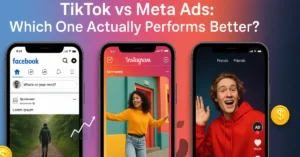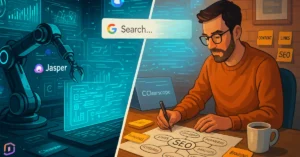Blog
Will SEO Be Replaced by AI in 2025?

The Elephant in the Room
Let’s not pretend it’s not happening—every digital marketer has either thought it or been asked: “Is SEO dead?” Or worse, “Will AI kill SEO entirely?”
The rise of generative AI tools like ChatGPT, Gemini, Jasper, and even Google’s Search Generative Experience (SGE) has sparked a growing unease among content creators, business owners, and SEO professionals alike. And honestly? It’s fair.
We’re standing on a digital fault line—where search behavior, content creation, and algorithms are shifting faster than ever. So if you’re wondering, “Will SEO be replaced by AI?” you’re not alone. But before you start prepping a eulogy for SEO, let’s take a beat. Because the real answer? It’s more complex—and way more interesting—than you might think.
1. SEO vs. AI: What’s Actually Happening?
First things first: this isn’t a fight. It’s not “AI versus SEO” in some Hunger Games-style digital deathmatch. It’s more like SEO is evolving, and AI is a major catalyst.
Think back—SEO started as a game of keywords, backlinks, and technical tweaks. Get the structure right, drop the right terms, and boom—you could rank. But over the years, Google (and other engines) got smarter. User intent started mattering more. Content quality came to the forefront. And now? We’ve moved into a new frontier where search engines are turning into answer engines.
This is where concepts like Answer Engine Optimization (AEO) and Generative Engine Optimization (GEO) come into play. Instead of simply matching keywords, search tools powered by AI now try to understand your question—and deliver a complete, synthesized answer. Think of it like asking a librarian for help and getting a custom-made cheat sheet instead of just a stack of books.
So no, SEO isn’t being replaced—it’s being reimagined.
2. What AI Is Already Doing in SEO
AI is already knee-deep in your SEO stack—you just might not realize it.
Let’s walk through a few things AI does really well:
-
Keyword Research: Tools like Surfer SEO, Clearscope, and Semrush use machine learning to analyze thousands of SERPs and suggest the most relevant, high-opportunity keywords.
-
Content Generation: Jasper, Writesonic, Copy.ai—all great for first drafts, outlines, meta descriptions, and even product copy. Quick, efficient, and mostly decent.
-
Technical SEO Audits: Platforms like Screaming Frog and Sitebulb have integrated AI to diagnose crawl issues, broken links, duplicate content—you name it.
-
On-Page Optimization: Surfer, MarketMuse, and Frase analyze top-ranking pages and give content guidelines (structure, headings, readability).
-
Search Evolution: With AI answering questions directly (hello, Google SGE), search results are no longer ten blue links—they’re summaries, snapshots, and sometimes no clicks at all.
It’s not that AI is “coming for SEO”—it’s already in your toolbox. The question is: what role should it play?
3. Will AI Replace SEO Professionals?
Here’s the thing: AI is brilliant at what it’s trained on. But it lacks context, nuance, and—frankly—a sense of humor. It doesn’t know your customer like you do. It doesn’t understand brand tone, emotional resonance, or why some topics feel like third rail issues in your industry.
AI can help write an article, sure. But can it write that article—the one that hits your audience just right, makes them laugh, or cry, or buy? Not quite.
SEO professionals aren’t going extinct. Their roles are just changing. We’re becoming more like strategic editors, data interpreters, and customer behavior analysts. The tactical, repeatable stuff—like meta tags or canonical links? Yeah, AI’s got that. But strategic SEO still requires a pulse, a gut feeling, and yes, sometimes a little sweat.
So if you’re wondering, “Will AI replace SEO professionals?” the short answer is no. But it will replace SEO professionals who don’t adapt.
4. Is SEO Dead in the Age of AI?
Let’s tackle this head-on: SEO is not dead. It’s just growing up.
Google isn’t ditching search; it’s just augmenting it. People still type questions. They still scan pages. They still care about credibility, layout, speed, and—surprise—relevance.
What’s dead is the old school “keyword stuffing + backlinks = traffic” formula. What’s alive? Intent-based SEO—where understanding the why behind a query is more important than the what.
Even with generative answers, people will still dig deeper. They’ll want supporting content, original insights, customer reviews, visuals, expert opinions—the kind of stuff AI can’t quite generate organically. That’s your edge.
So no, SEO isn’t dead. But it’s definitely had a wardrobe change.
5. The Rise of Generative Engine Optimization (GEO)
Here’s a fun twist: SEO is evolving into GEO—Generative Engine Optimization.
It’s a fancy term, but the idea is simple. Instead of optimizing for how a search engine indexes pages, you’re optimizing for how an AI system summarizes or synthesizes answers.
Think about ChatGPT-style tools. They’re pulling snippets, facts, and phrases from top sources to stitch together an answer. If your site isn’t structured well—clean headings, clear explanations, credible signals—it might get skipped.
So GEO is all about format, clarity, and structure:
-
Use schema markup
-
Answer questions directly in the first few sentences
-
Think “FAQ format”
-
Make content modular and skimmable
If traditional SEO was about getting ranked, GEO is about getting quoted.
6. What AI Can’t Do (Yet)
Let’s take a breather and ask: What can’t AI do?
-
Empathy: It can’t feel your customer’s frustration. It doesn’t know what it’s like to run a bakery in a pandemic or launch a Shopify store from your garage.
-
Culture: AI doesn’t do nuance. It can’t tell a regional joke from a bad pun. It doesn’t get slang or seasonal references unless it’s been fed examples.
-
Creativity: Real creativity isn’t remixing—it’s risking. AI won’t push boundaries unless a human tells it to.
-
Brand Voice: Sure, you can train an AI on tone. But that quirky, offbeat, human spark? Still elusive.
So while AI is powerful, it’s still a robot reading a map. You? You’ve been on the road.
7. How AI Is Reshaping SEO Strategies
AI isn’t killing SEO. It’s remixing the playlist.
Here’s how strategies are evolving:
-
From Static to Dynamic: We’re not just writing blog posts anymore. We’re creating modular content that works across SGE, voice search, chatbot answers, and social.
-
From Keywords to Intent: Forget targeting “coffee near me.” Think “best coffee spots for remote workers in Brooklyn.”
-
From Ranking to Quoting: Get cited in AI answers with clean data, clear value, and credible backlinks.
-
From Content Creation to Experience Creation: SEO now involves UX, page speed, accessibility, even brand perception.
It’s not just about climbing the SERP—it’s about staying visible in a landscape where answers come before links.
8. Will SEO Jobs Exist in the AI Era?
Yes. And they’ll be more interesting than ever.
Here’s what will matter most:
-
Strategic Thinkers: People who can plan long-term campaigns, not just tweak H1s.
-
Customer Whisperers: Folks who understand how real people search and think.
-
Creative Technologists: SEO pros who blend content, code, and creativity.
-
AI Integrators: Specialists who know how to use AI without losing their human edge.
If you can evolve from task execution to outcome ownership, your future’s not just safe—it’s bright.
9. Practical SEO in a Generative AI World
So what does a practical SEO strategy look like now? Here’s a quick breakdown:
-
Structure Everything: Use schema markup, FAQs, and bullet points.
-
Write for Humans, Format for AI: Craft emotionally resonant content, but with headings, summaries, and scannable bits.
-
Use AI, Don’t Rely on It: Tools like Clearscope and Surfer are great, but don’t publish without a human read.
-
Update Old Content: Refresh based on what generative engines are surfacing now.
-
Think Multi-Modal: Visual search, voice search, chatbot prompts—it’s all fair game.
And honestly? Keep testing. AI tools shift fast. What worked last quarter might get buried next month. Stay curious.
10. AI vs Human SEO: Who Wins?
Okay—final round. AI vs Human SEO: who wins?
Here’s the twist. It’s not a competition. It’s a collaboration.
AI brings speed, scale, and data-crunching power. Humans bring intuition, context, and creativity. Together? You get something way more powerful than either alone.
So if you’re still asking “Can AI fully automate SEO tasks?”—the answer is: some of them, yes. But not the ones that make your brand memorable.
Conclusion: It’s Not the Death of SEO—It’s the Reinvention
Let’s end where we began.
Will SEO be replaced by AI? No. But it will be rewritten by it.
The question isn’t whether SEO survives—it’s whether we evolve fast enough to keep up. The real winners? They won’t be the ones who reject AI outright or blindly embrace it. They’ll be the ones who blend human insight with machine intelligence, who get that SEO today is about conversations, not just keywords.
So don’t fear the algorithm. Learn from it. Partner with it. And keep showing up with the one thing AI still can’t fake: your human spark.









